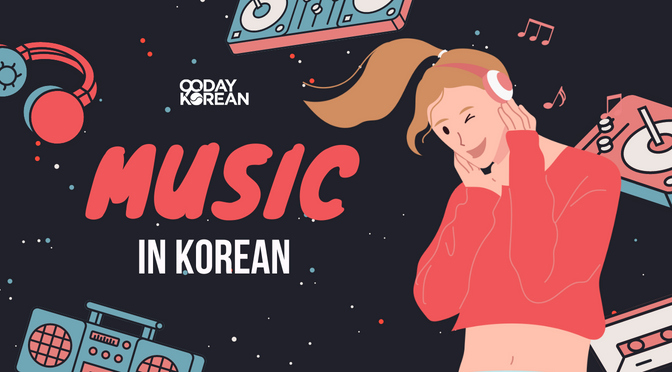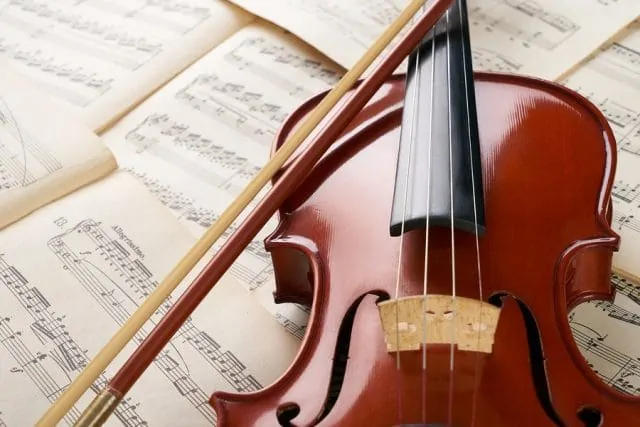In this article, we will learn how to say “music” in Korean. After all, in every shop and restaurant you go to, and in every show on TV or movie you watch, you hear some sort of music being played.
Many people love to listen to music on their commute, on the radio when driving, or on the stereo at home. Not to mention how K-pop has become a worldwide sensation (thanks to bands like Blackpink, BTS, and many more). In other words, music is a big part of most people’s lives.
If you have an interest in learning more about music and terms for it or simply buff up your Korean vocabulary, follow us along for more. Today, you’ll be learning different musical instruments and music genres in the Korean language and more!
Once you know all this vocabulary, you’ll be able to enjoy our cultural articles on Korean music and appreciate Korean culture even more. Besides talking about your favorite music in general, you’ll also be able to tell people about your hobbies which include playing musical instruments.
Contents
“Music” in Korean
The first and most basic word for “music” to learn in Korean is 음악 (eumak). This word is the general word used when discussing music.
If your hobby happens to be “listening to music,” you can describe it with the word 음악 듣기 (eumak deutki). 듣기 (deutki) is a noun form of the Korean verb, 듣다 (deutda).
The word 곡 (gok) also means “music,” but it is used more as a word that describes a specific song, or the instrumental music in a song rather than just music generally.
Sample Sentences
악보를 읽을 줄 아세요? (akboreul ilkeul jul aseyo?)
Do you know how to read music?
대학교에서 음악을 공부해요. (daehakgyoeseo eumageul gongbuhaeyo.)
I study music at university.
요즘은 음악을 잘 안 듣고 있네요. (yojeumeun eumageul jal an deutgo itneyo.)
These days I don’t really listen to music.
난 K팝 음악 좋아해. (nan keipab eumak johahae.)
I like K-pop music.
나는 대학교 음악 동아리 활동을 하고 있어. (naneun daehakgyo eumak dongari hwaldongeul hago isseo.)
I participate in the university’s music club.
어떤 음악을 좋아해? (eotteon eumageul johahae?)
What kind of music do you like?
케이팝 음악을 듣고 가사를 외우며 한국어를 배워요. (keipap eumageul deutgo gasareul oeumyeo hangugeoreul baewoyo.)
I learn Korean by listening to K-Pop music and memorizing the lyrics.
공부할 때 음악을 들면 더 좋게 집중할 수 있어요. (gongbuhal ttae eumageul deulmyeon deo joke jipjunghal su isseoyo.)
I can focus better if I listen to music while studying.
음악 소리 좀 줄여 주시겠어요? (eumak sori jom jullyeo jusigesseoyo?)
Can you please turn the music down?
학원에서 기타를 배우지 않았어요. 대신 처음부터 개인교사가 있었어요. (hagwoneseo gitareul baeuji anasseoyo. daesin cheoeumbuteo gaeingyosaga isseosseoyo.)
I did not learn to play guitar in an academy. Instead, I had a private teacher since the beginning.
Music genres in Korean
Let’s kick off with vocabulary related to Korean music genres! Recently we published an article telling you all about the most popular music genres in South Korean music scene. You can go check out that article if you’re interested in knowing what type of music is most commonly made in Korea (such as traditional Korean music, K-Pop, contemporary music, folk songs, hip-hop, and so much more)!
By learning the terms for each genre in Korean also, you can then also go on to have deeper conversations on the topic with your Korean friends and Korean people in general.
“Genre” in Korean
The word for “genre” in Korean is 장르 (jangneu). You may note that this is a Konglish word. In other words, the base of the word is just like the English word “genre.” However, the pronunciation and, thus, spelling has been modified to fit Korean standards.
Sometimes you can also use the word 종류 (jongnyu) when talking about music genres. Specifically, when using the word 종류 (jongnyu) you can express the kind of music you are talking about, regardless of the genre.
For example, even within rock or pop music genres, very different types of songs are being created. And just because you like the genre in general, there may be some kinds of songs you especially like, and others you don’t.
You can classify and separate those songs in conversations by using the word 종류 (jongnyu). For example, the different styles under Latin American, African, or Middle Eastern music can also be talked about using the word 종류.
Music genres in Korean
Below are different words related to music genres in Korean.
| English | Korean |
|---|---|
| A cappella | 아카펠라 (akapella) |
| Ballad | 발라드 (balladeu) |
| Blues | 블루스 (beulluseu) |
| Christian music | 기독교 음악 (gidokgyo eumak) |
| Classical music | 클래식 음악 (keullaesik eumak) |
| Country | 컨트리 (keonteuri) |
| Disco | 디스코 (diseuko) |
| Electronic music | 전자 음악 (jeonja eumak) |
| Folk music | 민속 음악 (minsok eumak) |
| Gospel | 복음 (bokeum) |
| Hard rock | 하드 록 (hadeu rok) |
| Heavy metal | 헤비메탈 (hebimetal) |
| Hip hop | 힙합 (hiphap) |
| Indie music | 인디 음악 (indi eumak) |
| Instrumental | 기악 (giak) |
| Jazz | 재즈 (jaejeu) |
| K-Pop | 케이팝 (keipap) |
| Middle Eastern music | 중동 음악 (jungdong eumak) |
| Music of Africa | 아프리카 음악 (apeurika eumak) |
| Music of Latin America | 라틴 음악 (latin eumak) |
| Opera | 오페라 (opera) |
| Pop | 가요 (gayo) |
| Pop | 팝 (pap) |
| Pop rock | 팝 록 (pap rok) |
| Punk | 펑크 (peongkeu) |
| Rap | 랩 (raep) |
| Reggae | 레게 (rege) |
| Rhythm and blues | 리듬 앤 블루스 (rideum aen beulluseu) |
| Rock | 록 (rok) |
| Rock 'n Roll | 락앤롤 (rakaenrol) |
| Ska | 스카 (seuka) |
| Soul music | 소울 뮤직 (soul myujik) |
| Traditional music | 전통 음악 (jeontong eumak) |
| Trot | 트로트 (teuroteu) |
Musical instruments in Korean
Of course, no lesson on music vocabulary is full without touching on the vocabulary for different instruments you can use to create the music. Below is a list of different musical instruments.
| English | Korean |
|---|---|
| Musical instrument | 악기 (akgi) |
| Accordion | 아코디언 (akodieon) |
| Acoustic guitar | 통기타 (tonggita) |
| Bagpipe | 백파이프 (baekpaipeu) |
| Bass | 베이스 (beiseu) |
| Bassoon | 바순 (basun) |
| Bugle | 나팔 (napal) |
| Castanets | 캐스터네츠 (kaeseuteonecheu) |
| Cello | 첼로 (chello) |
| Clarinet | 클라리넷 (keullarinet) |
| Cymbal | 심벌 (simbeol) |
| Double-bass | 더블 베이스 (deobeul beiseu) |
| Drum | 드럼 (deureom) |
| Electric guitar | 일렉트릭 기타 (illekteurik gita) |
| Flute | 플루트 (peulluteu) |
| Gong | 공 (gong) 징 (jing) |
| Grand piano | 그랜드 피아노 (geuraendeu piano) |
| Guitar | 기타 (gita) |
| Harmonica | 하모니카 (hamonika) |
| Harp | 하프 (hapeu) |
| Keyboard | 건반 (geonban) |
| Maraca | 마라카 (maraka) |
| Oboe | 오보에 (oboe) |
| Organ | 오르간 (oreugan) |
| Percussion | 타악기 (taakgi) |
| Piano | 피아노 (piano) |
| Saxophone | 색소폰 (saeksopon) |
| Synthesizer | 신시사이저 (sinsisaijeo) |
| Tambourine | 탬버린 (taembeorin) |
| Triangle | 트라이앵글 (teurainaenggeul) |
| Trombone | 트롬본 (teurombon) |
| Trumpet | 트럼펫 (teureompet) |
| Tuba | 튜바 (tyuba) |
| Viola | 비올라 (biolla) |
| Violin | 바이올린 (baiollin) |
| Xylophone | 실로폰 (sillopon) |
| To play a musical instrument | 악기를 연주하다 (akgireul yeonjuhada) |
Here are a few more words that are in some way connected to the music scene in South Korea and can therefore be fun to learn. Many of these can be particularly handy when discussing K-pop and the process behind it.
| English | Korean |
|---|---|
| Audition | 오디션 (odisyeon) |
| Band | 밴드 (baendeu) |
| Boy group | 보이그룹 (boigeurup) |
| Comeback | 컴백 (keombaek) |
| Girl group | 걸그룹 (geolgeurup) |
| Harmony | 화음 (hwaeum) |
| Hymn | 찬송가 (chansongga) |
| Idol group | 아이돌 그룹 (aidol geurup) |
| K-Pop idol | 케이팝 아이돌 (keipab aidol) |
| Lyrics | 가사 (gasa) |
| Melody | 멜로디 (mellodi) |
| Music industry | 음악 산업 (eumak saneop) |
| Music store | 음반 가게 (eumban gage) |
| Music video | 뮤직 비디오 (myujik bidio) |
| Pop song | 팝송 (papsong) |
| Popular song | 가요 (gayo) |
| Scouting | 스카우트 (seukauteu) |
| Singer | 가수 (gasu) |
| Solo artist | 솔로 아티스트 (sollo atiseuteu) |
| Song | 노래 (norae) |
| Song, piece of music | 곡 (gok) |
| Soundtrack | 사운드 트랙 (saundeu teuraek) |
| Symphony | 교향곡 (gyohwanggok) |
| Tune | 곡조 (gokjo) |
How to Say “Song” in Korean
The word for “song” in Korean is 노래 (norae). This is, of course, an important word to know in relation to music. You can use it to describe Korean songs in various genres, from pop to hip-hop.
If you want to be specific about what country the song came from, just add the country in front of the word 노래 (norae). For example, a Korean song is 한국 노래 (hanguk norae), a Chinese song is 중국 노래 (jungguk norae), and so on.
If you’re familiar with karaoke, its Korean term is 노래방 (noraebang), which is a combination of 노래 (norae|song) and 방 (bang|room).
Another word for song in Korean is 곡 (gok). More specifically, it means “a piece of music.” It can be used, for example, to put emphasis on the tune, melody, or composition behind a song or an instrumental piece of music, like a classical composition.
Speaking of songs, if you want to learn Korean with easy songs, you can try learning some Korean alphabet songs!
Here are some sentences so you can see in action how these words can be used in Korean:
저는 발라드 장르 노래를 잘 불러요. (jeoneun balladeu jangneu noraereul jal bulleoyo.)
I sing songs of the ballad genre well.
이 노래를 들으면 따라 부르고 싶어요. (i noraereul deureumyeon ttara bureugo sipeoyo.)
When I hear this song, I want to sing along.
오늘 밤에 모차르트의 제일 유명한 곡을 연주할 거에요. (oneul bame mochareuteuui jeil yumyeonghan gogeul yeonjuhal geoeyo.)
Tonight, I will play Mozart’s most famous piece of music.
이 곡에 어떤 가사가 좋을까요? (i goge eotteon gasaga joeulkkayo?)
What kind of lyrics would be good in this song?
제일 좋아하는 한국 노래는 뭐예요? (jeil joahaneun hanguk noraeneun mwoyeyo?)
What is your favorite Korean song?
Sample dialogues
Finally, here are some sample sentences and dialogues to get you started on talking about music with your Korean friends.
Dialogue 1:
A: 케이팝 음악을 좋아해요? (keipap eumageul joahaeyo?)
Do you like K-Pop?
B: 네! 케이팝 음악을 매일 들어요. (ne! keipap eumageul maeil deureoyo.)
Yes! I listen to K-Pop everyday.
A: 어떤 케이팝 그룹을 가장 좋아해요? (eotteon keipap geurubeul gajang joahaeyo?)
Which K-Pop group do you like the most?
B: 흠… 요즘 특히 블랙핑크를 좋아해요. (heum… yojeum teuki beullaekpingkeureul joahaeyo.)
Hmm… These days I especially like Blackpink.
Dialogue 2:
A: 피아노를 배운지 얼마나 되었어요? (pianoreul baeunji eolmana doeeosseoyo?)
How long have you been learning piano?
B: 열한 살 때 피아노를 치기 시작했어요. 그러니까… 칠 년 전에 피아노를 배우기 시작했어요. (yeolhan sal ttae pianoreul chigi sijakaesseoyo. geureonikka… chil nyeon jeone pianoreul baeugi sijakaesseoyo.)
I started playing piano when I was 11-years-old. So… I started learning piano 7 years ago.
A: 우와! 되게 멋있어요! (uwa! doege meosisseoyo!)
Wow! That’s so cool!
Wrap Up
Do you play any instruments? If so, which one(s) do you play, and for how long? And what kind of music do you like? Looking back on South Korea’s history, their music has evolved and different genres have become available in the modern day. From Korean traditional music to K-Pop. Now that you’ve learned all this awesome vocabulary in relation to music, perhaps you’d like to answer those questions for us below in the comments!
And if you’re not quite done learning with us yet today? Perhaps you’d like to learn about other kinds of hobbies in Korean next? Or how about a deeper dive into Korean music and K-Pop songs specifically?






